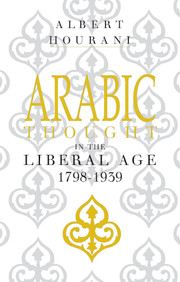Book contents
- Frontmatter
- Contents
- Preface to the 1983 reissue
- Note on Transliteration and References
- I THE ISLAMIC STATE
- II THE OTTOMAN EMPIRE
- III FIRST VIEWS OF EUROPE
- IV THE FIRST GENERATION: TAHTAWI, KHAYR AL-DIN, AND BUSTANI
- V JAMAL AL-DIN AL-AFGHANI
- VI MUHAMMAD ‘ABDUH
- VII ‘ABDUH'S EGYPTIAN DISCIPLES: ISLAM AND MODERN CIVILIZATION
- VIII EGYPTIAN NATIONALISM
- IX RASHID RIDA
- X CHRISTIAN SECULARISTS: SHUMAYYIL AND ANTUN
- XI ARAB NATIONALISM
- XII TAHA HUSAYN
- XIII EPILOGUE: PAST AND FUTURE
- Select Bibliography
- Index
Preface to the 1983 reissue
Published online by Cambridge University Press: 05 June 2012
- Frontmatter
- Contents
- Preface to the 1983 reissue
- Note on Transliteration and References
- I THE ISLAMIC STATE
- II THE OTTOMAN EMPIRE
- III FIRST VIEWS OF EUROPE
- IV THE FIRST GENERATION: TAHTAWI, KHAYR AL-DIN, AND BUSTANI
- V JAMAL AL-DIN AL-AFGHANI
- VI MUHAMMAD ‘ABDUH
- VII ‘ABDUH'S EGYPTIAN DISCIPLES: ISLAM AND MODERN CIVILIZATION
- VIII EGYPTIAN NATIONALISM
- IX RASHID RIDA
- X CHRISTIAN SECULARISTS: SHUMAYYIL AND ANTUN
- XI ARAB NATIONALISM
- XII TAHA HUSAYN
- XIII EPILOGUE: PAST AND FUTURE
- Select Bibliography
- Index
Summary
My purpose in writing this book was not to give a general history of all kinds of thought expressed by Arabs, or in the Arabic language, during the nineteenth and earlier twentieth centuries. I was concerned with thought about politics and society within a certain context: that created by the growth of European influence and power in the Middle East and North Africa. In the course of the period which the book covers, the Arabic-speaking peoples were drawn, in different ways, into the new world-order which sprang from the technical and industrial revolutions. It was an order which expressed itself in the growth of European trade of a new kind, the consequent changes in production and consumption, the spread of European diplomatic influence, the imposition in some places of European control or rule, the creation of schools on a new model, and the spread of new ideas about how men and women should live in society. It is to such ideas that I refer rather loosely when I use the word ‘liberal’ in the title; this was not the first title I chose for the book, and I am not quite satisfied with it, for the ideas which had influence were not only ideas about democratic institutions or individual rights, but also about national strength and unity and the power of governments.
As the century went on, it became more and more difficult to ignore the processes of change and not to react to them in some way.
- Type
- Chapter
- Information
- Arabic Thought in the Liberal Age 1798–1939 , pp. iv - xPublisher: Cambridge University PressPrint publication year: 1983



